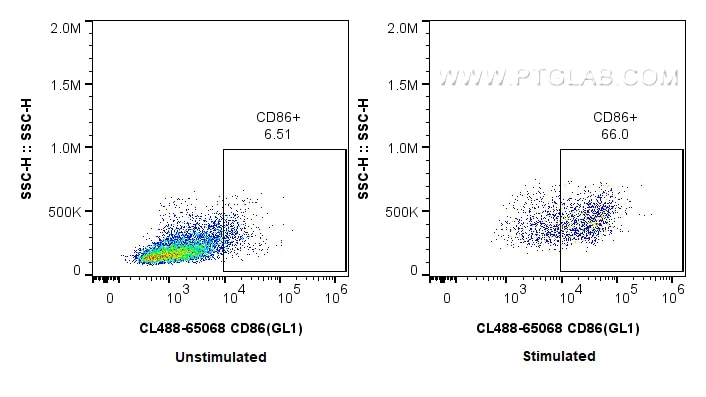Tested Applications
| Positive FC detected in | LPS treated C57BL/6 mouse splenocytes |
Recommended dilution
| Application | Dilution |
|---|---|
| Flow Cytometry (FC) | FC : 0.5 ug per 10^6 cells in 100 μl suspension |
| This reagent has been tested for flow cytometric analysis. It is recommended that this reagent should be titrated in each testing system to obtain optimal results. | |
| Sample-dependent, Check data in validation data gallery. | |
Published Applications
| FC | See 1 publications below |
Product Information
CL488-65068 targets CD86 in FC applications and shows reactivity with mouse samples.
| Tested Reactivity | mouse |
| Cited Reactivity | mouse |
| Host / Isotype | Rat / IgG2a, kappa |
| Class | Monoclonal |
| Type | Antibody |
| Immunogen |
LPS-activated CBA/Ca mouse spleen B cells Predict reactive species |
| Full Name | CD86 antigen |
| GenBank Accession Number | BC013807 |
| Gene Symbol | Cd86 |
| Gene ID (NCBI) | 12524 |
| RRID | AB_2883160 |
| Conjugate | CoraLite® Plus 488 Fluorescent Dye |
| Excitation/Emission Maxima Wavelengths | 493 nm / 522 nm |
| Form | Liquid |
| Purification Method | Affinity purification |
| UNIPROT ID | P42082 |
| Storage Buffer | PBS with 0.09% sodium azide and 0.5% BSA, pH 7.3. |
| Storage Conditions | Store at 2-8°C. Avoid exposure to light. Stable for one year after shipment. |
Background Information
CD86 (also known as B7-2) is a costimulatory molecule belonging to the immunoglobulin superfamily. Primarily expressed on antigen-presenting cells (APCs), including B cells, dendritic cells, and macrophages, CD86 is the ligand for two proteins at the cell surface of T cells, CD28 antigen and CTLA-4. Binding of CD86 with CD28 antigen is a costimulatory signal for activation of the T-cell. Binding of CD86 with CTLA-4 negatively regulates T-cell activation and diminishes the immune response. (PMID: 7513726; 1847722; 11029388; 27591335)




